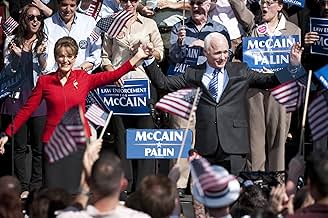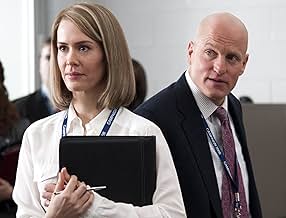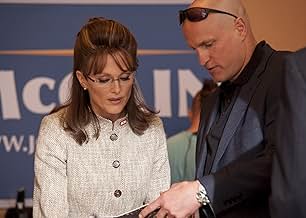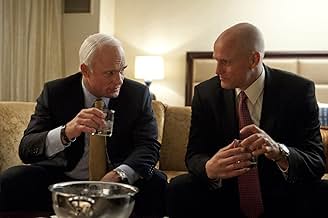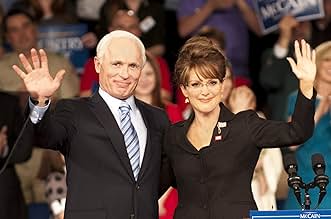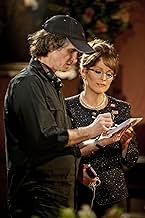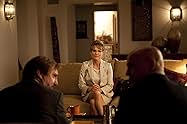IMDb-BEWERTUNG
7,4/10
23.848
IHRE BEWERTUNG
Füge eine Handlung in deiner Sprache hinzuGovernor Sarah Palin of Alaska becomes Senator John McCain's running mate in the 2008 Presidential election.Governor Sarah Palin of Alaska becomes Senator John McCain's running mate in the 2008 Presidential election.Governor Sarah Palin of Alaska becomes Senator John McCain's running mate in the 2008 Presidential election.
- Regie
- Drehbuch
- Hauptbesetzung
- 5 Primetime Emmys gewonnen
- 31 Gewinne & 43 Nominierungen insgesamt
Empfohlene Bewertungen
You know what I expected from this film? A brutally simplistic mockery of the last Republican campaign just before the next one starts happening – it seemed an open goal and it seemed that the film was made too soon to be able to be objective and probably had no intention of being so anyway. Imagine my surprise when I found myself watching a film that, some cheap shots aside, is generally fair and balanced in how it plays back the McCain campaign. The film picks up the plot just as McCain is struggling against Obama and decides to play a wild-card by bringing in a poorly vetted Senator Palin to try and win key voter share back. The gambit starts out working great but, for several reasons, it quickly starts to unravel while the Obama campaign only gets stronger.
It is worth me saying at this point that I am pretty liberal in my politics and that I did nothing but laugh at Palin throughout her campaign, all the way till I shed a few tears over Obama's victory speech as I watched it at 6am in the UK. I continue to look at her working as a "talking point" pundit on Fox and marvel at her ability to provide generic bile and if I am honest, I would not have been totally dismayed if this film had been a two-hour kicking of her. However what we actually get is much better and fairer than this and it is only really at the back end of the film where it shows its colours by having a few unnecessary lines and digs thrown in there to no real benefit. The film shows that he McCain campaign took a necessary risk with their candidate and that the risk didn't pay off. It shows that Palin is not some glassy eyed idiot but rather a person who is overwhelmed at first but then makes the mistake of believing her own hype on the news after one successful debate.
This is done in such a way that it works – it doesn't suggest that it was deliberate or that these people are those portrayed on the news, but rather than both decisions and mistakes were made. If anything one could argue that the film doesn't do enough to show how much the campaign got away from under McCain's team – look at the "he's an Arab" moment here, it is much more gentle than the reality, which saw McCain frantically grasp the microphone from his target voter and quickly correct her – in the film it is much softener than that. This change in the campaign is fairly pinned on Palin and it shows her starting to believe her own press and believe that being herself is the all whereas really her stage-managed self was the thing that worked. I liked that her advisors all had that worried look when she spoke, all knew they were training someone who desperately needed training as opposed to polishing and all could see the risk going south.
She isn't presented as an idiot though. Palin is a real person here and you feel for her as she feels out of her depth and also as she convinces herself that she is more than she really is. It also allows you to understand why she goes this path and it is certainly not a mockery of her because it is fair and it is intelligently done. There are several moments and lines later in the film that don't play as fair though and these are rather unnecessary and blunt, but mostly it is well done. The cast do pretty well considering. Moore is not just another Tina Fey but, thanks to the script, really gets her character and makes something of it. Harris starts well as McCain but his character is rather lost in events and I thought he deserved more – and, in fairness, I thought the real McCain was better. Harrelson delivers a strong performance throughout and it is in his character that the impact of Palin is played out – he gives it straight as a political player and it works well. The support cast is full of faces from MacNicol to Livingston to Altman and generally they all do a good job.
Overall then, this is an engaging and intelligent film that more or less manages to be fair and balanced in regards the presentation of the McCain campaign. It shows the decisions and risks within the campaign and the development of brand Palin in a way that is clear and even-handed and it makes for a good film as a result. Not perfect but certainly much better than what I expected.
It is worth me saying at this point that I am pretty liberal in my politics and that I did nothing but laugh at Palin throughout her campaign, all the way till I shed a few tears over Obama's victory speech as I watched it at 6am in the UK. I continue to look at her working as a "talking point" pundit on Fox and marvel at her ability to provide generic bile and if I am honest, I would not have been totally dismayed if this film had been a two-hour kicking of her. However what we actually get is much better and fairer than this and it is only really at the back end of the film where it shows its colours by having a few unnecessary lines and digs thrown in there to no real benefit. The film shows that he McCain campaign took a necessary risk with their candidate and that the risk didn't pay off. It shows that Palin is not some glassy eyed idiot but rather a person who is overwhelmed at first but then makes the mistake of believing her own hype on the news after one successful debate.
This is done in such a way that it works – it doesn't suggest that it was deliberate or that these people are those portrayed on the news, but rather than both decisions and mistakes were made. If anything one could argue that the film doesn't do enough to show how much the campaign got away from under McCain's team – look at the "he's an Arab" moment here, it is much more gentle than the reality, which saw McCain frantically grasp the microphone from his target voter and quickly correct her – in the film it is much softener than that. This change in the campaign is fairly pinned on Palin and it shows her starting to believe her own press and believe that being herself is the all whereas really her stage-managed self was the thing that worked. I liked that her advisors all had that worried look when she spoke, all knew they were training someone who desperately needed training as opposed to polishing and all could see the risk going south.
She isn't presented as an idiot though. Palin is a real person here and you feel for her as she feels out of her depth and also as she convinces herself that she is more than she really is. It also allows you to understand why she goes this path and it is certainly not a mockery of her because it is fair and it is intelligently done. There are several moments and lines later in the film that don't play as fair though and these are rather unnecessary and blunt, but mostly it is well done. The cast do pretty well considering. Moore is not just another Tina Fey but, thanks to the script, really gets her character and makes something of it. Harris starts well as McCain but his character is rather lost in events and I thought he deserved more – and, in fairness, I thought the real McCain was better. Harrelson delivers a strong performance throughout and it is in his character that the impact of Palin is played out – he gives it straight as a political player and it works well. The support cast is full of faces from MacNicol to Livingston to Altman and generally they all do a good job.
Overall then, this is an engaging and intelligent film that more or less manages to be fair and balanced in regards the presentation of the McCain campaign. It shows the decisions and risks within the campaign and the development of brand Palin in a way that is clear and even-handed and it makes for a good film as a result. Not perfect but certainly much better than what I expected.
It's 2008; near the end of the Presidential Campaign between John McCain and then candidate Barack Obama. McCain is trailing in the polls and his campaign realizes he has to do something to energize his base and turn the election in his favour. He makes a decision that would not only have significant impact on the race, but the entire Republican party and ultimately define his political career.
First off the casting is excellent; both Julianne Moore and Ed Harris are perfectly cast and they deliver uncanny performances of Sarah Palin and John McCain. I found at times I got lost in the characters and forgot I was watching actors act; they were THAT good (this is really rare for me). Julianne Moore is very deserving of all the buzz she's been getting and I'm disappointed Ed Harris hasn't quite got as much publicity; his John McCain was not that far behind Moore's Palin (but make no mistake, Moore is the star here).
I loved the editing of the film as they fused together actual footage from the campaign trail and with scenes recreated in the film to great effect. I also found that the film shed some light on aspects of the campaign I didn't really think about; i.e. the other side of Sarah Palin. She was clearly someone who was just thrust into spotlight and was clearly not ready for the big stage. Moore really humanized her and did something that nothing else did that entire election cycle; not the media nor the politicos: it made me feel sorry for Sarah Palin (I have to say, I wasn't expecting that, not at all). There's quite a few laughs as well in the movie; including moments from hilarious foreign policy coaching sessions to the now infamous interview with Katie Couric when she essentially says "I can see Russia from my house" and couldn't name news papers she reads.
Now the movie isn't perfect. The film is a bit late in terms of release and I can't help but think that had a bit to do with some the negative reviews; for those outside the political bubble, the film may have lost a bit of it's punch almost 4 years after the fact. For me however, a political junkie, the film was still quite poignant. You could also argue the film has an agenda; i.e. to paint Palin as someone who cared more about how she looked and her own career more than John McCain's campaign, not very intelligent and reckless as she was derailing his campaign by "going rogue" (going off message) near the end. Although I personally believe all these to be true, the film does try to lead the viewer at times to that conclusion and I would've preferred if it was a bit more unbiased and allowed the viewer to form their own opinion.
At the end of the day I think the film successfully presented the theme of being honest with one's self; that when it comes to getting ahead in life, you need to be true to yourself and your values. The movie conveyed this through the characters around Palin in moments of reflection. In the film (and in real life) John McCain wasn't true to himself and it cost him the election (and maybe a bit of his soul too). At the end you could see he had begun to realize that; there's a great scene where John is at a town hall and an audience member says that "Obama is a Muslim" and he quickly stopped the audience member, corrected her and stated that it was not true and he didn't believe that. In that moment it was clear he realized he had gone astray as his campaign was now solely relying on really low brow tactics to try to save the election. It was as significant a moment in the film as it was in the real campaign.
I'm left with a really interesting moment from the film, where one of McCain's Republican advisers confesses that she didn't vote (which has to be nothing short of treason when you work for a campaign):
"I didn't vote... I couldn't do it... I didn't vote." (She starts to cry and moves to be hugged by Woody Harrelson's character (Steve)... "I couldn't do it.".
I can't help but think a lot of Americans had to feel exactly the same way in 2008. That single moment says everything you need to know about Sarah Palin and the 2008 Presidential Election. Kudos to a well made film.
www.themoviesnob.ca
@the_movie_snob
First off the casting is excellent; both Julianne Moore and Ed Harris are perfectly cast and they deliver uncanny performances of Sarah Palin and John McCain. I found at times I got lost in the characters and forgot I was watching actors act; they were THAT good (this is really rare for me). Julianne Moore is very deserving of all the buzz she's been getting and I'm disappointed Ed Harris hasn't quite got as much publicity; his John McCain was not that far behind Moore's Palin (but make no mistake, Moore is the star here).
I loved the editing of the film as they fused together actual footage from the campaign trail and with scenes recreated in the film to great effect. I also found that the film shed some light on aspects of the campaign I didn't really think about; i.e. the other side of Sarah Palin. She was clearly someone who was just thrust into spotlight and was clearly not ready for the big stage. Moore really humanized her and did something that nothing else did that entire election cycle; not the media nor the politicos: it made me feel sorry for Sarah Palin (I have to say, I wasn't expecting that, not at all). There's quite a few laughs as well in the movie; including moments from hilarious foreign policy coaching sessions to the now infamous interview with Katie Couric when she essentially says "I can see Russia from my house" and couldn't name news papers she reads.
Now the movie isn't perfect. The film is a bit late in terms of release and I can't help but think that had a bit to do with some the negative reviews; for those outside the political bubble, the film may have lost a bit of it's punch almost 4 years after the fact. For me however, a political junkie, the film was still quite poignant. You could also argue the film has an agenda; i.e. to paint Palin as someone who cared more about how she looked and her own career more than John McCain's campaign, not very intelligent and reckless as she was derailing his campaign by "going rogue" (going off message) near the end. Although I personally believe all these to be true, the film does try to lead the viewer at times to that conclusion and I would've preferred if it was a bit more unbiased and allowed the viewer to form their own opinion.
At the end of the day I think the film successfully presented the theme of being honest with one's self; that when it comes to getting ahead in life, you need to be true to yourself and your values. The movie conveyed this through the characters around Palin in moments of reflection. In the film (and in real life) John McCain wasn't true to himself and it cost him the election (and maybe a bit of his soul too). At the end you could see he had begun to realize that; there's a great scene where John is at a town hall and an audience member says that "Obama is a Muslim" and he quickly stopped the audience member, corrected her and stated that it was not true and he didn't believe that. In that moment it was clear he realized he had gone astray as his campaign was now solely relying on really low brow tactics to try to save the election. It was as significant a moment in the film as it was in the real campaign.
I'm left with a really interesting moment from the film, where one of McCain's Republican advisers confesses that she didn't vote (which has to be nothing short of treason when you work for a campaign):
"I didn't vote... I couldn't do it... I didn't vote." (She starts to cry and moves to be hugged by Woody Harrelson's character (Steve)... "I couldn't do it.".
I can't help but think a lot of Americans had to feel exactly the same way in 2008. That single moment says everything you need to know about Sarah Palin and the 2008 Presidential Election. Kudos to a well made film.
www.themoviesnob.ca
@the_movie_snob
This film is a fascinating look behind the scenes of the most failed act of political cynicism in recent American history: the selection of Sarah Palin as John McCain's running mate for his 2008 presidential campaign. We are introduced to a candidate, John McCain, and a campaign, lead by Steve Schmidt, that is on it's knees. They are desperate and in need of a break, and they throw a Hail Mary pass to Alaska Governor, Sarah Palin. But she is only the first in a series of Hail Mary passes to come. Woody Harillson gives perhaps his best performance ever as Steve Schmidt, a man who is rearranging the deck chairs on this flailing campaign, as fast as he can, before it disappears below the surface. Ed Harris turns in his usual masterful interpretation of a complicated-underneath, but simple-on-the-surface, character, as John McCain. But it is Julianne Moore that is the steel girder of this narrative. She is the embodiment of what we now know to be the Palin phenomenon with all of it's cartoonish qualities and, by equal measures it's dire, and potentially catastrophic, possibilities. Moore delivers, subtly, the Palin we all know, overflowing with unfounded, unearned, unqualified, confidence.
The script is very well written and the pace of the story is exact. The final tableau of Sarah Palin standing on stage with McCain at his concession speech, hearing the crowd swell with the mention of her name, was reminiscent of Glenn Close gasping for air as she rose from the bathtub in the final scene of "Fatal Attraction". As Palin winks her cash-register-eyes you can almost see dollar signs in her pupils, and hear a "ka-ching" sound foreshadow the future. It will send a chill up your spine.
My only complaint about this film has nothing to do with its production values. It's a great film and will be well rewarded, deservedly, when the Emmys are handed out. My complaint about this film has to do with its politics. Sarah Palin was MUCH worse than she was portrayed in this film. Forget "anonymous" sources. Just look at the public record. The writers, in an attempt to appear "fair", intentionally leave out the most egregious information gaffs in both the Gibson and Couric interviews. No one can forget the moment when Charles Gibson asked Sarah Palin about the "Bush Doctrine" and she had no idea what he was talking about. Or when Katie Couric asked her if she could recall "one Supreme Court decision" with which she disagreed (Roe v. Wade!!!) and she couldn't name one. Those were iconic moments in this chilling brush with cataclysm. But their omission was not the worst offense done by the editing that no doubt softened Palin's image. The worst was how her gaffs WERE introduced to the film viewer. One of them is parroted to us through the infamous SNL skit with Tina Fey, on a hotel television, as a cringing Sarah Palin watches. This omission from the direct storyline (as it really occurred), and indirect delivery through the "liberal" media (SNL) made Palin look less clueless than she actually was. And made the "lame stream media" look predatory and cruel. They were not. Result: undeserved sympathy for the central character, Sarah Palin.
Sadly, this is what HBO does. They play things down the middle even when the facts have clearly crossed over the median and are speeding the wrong way into oncoming traffic. When "what do you read" is considered "gotcha", we're way out of balance. And HBO manufacturing an artificial balance where there was none before? Not good. There are not always two equal sides to a story. HBO's dilution of the real story as it unfolded, in an attempt to seem "unbiased", does a disservice to this otherwise brilliant film, and to history.
Game Change shows us the worst in political gamesmanship - the unbridled cynicism that lead an all male campaign staff to choose a political bimbo to be "a seventy-two year old heartbeat away from the presidency". And it shows us the worst in American political celebrity in the form of Sarah Palin with all of her race baiting and blind religious ideology that substitute for facts in her view of the world. She is oblivious to the geo-political winds that howl around this planet. Yet she would not hesitate to invade Iraq all over again because "Saddam Hussein attacked us on 911". Yes, seven years after 911 she was still unaware that that was a lie because her faith and her convictions substituted for the facts. This, I think more than anything, is what this story comes down to. The world is complicated and dangerous and the levers of power should not be in the hands of someone who is uninformed, reckless, and misguided. The stakes are simply too high.
The script is very well written and the pace of the story is exact. The final tableau of Sarah Palin standing on stage with McCain at his concession speech, hearing the crowd swell with the mention of her name, was reminiscent of Glenn Close gasping for air as she rose from the bathtub in the final scene of "Fatal Attraction". As Palin winks her cash-register-eyes you can almost see dollar signs in her pupils, and hear a "ka-ching" sound foreshadow the future. It will send a chill up your spine.
My only complaint about this film has nothing to do with its production values. It's a great film and will be well rewarded, deservedly, when the Emmys are handed out. My complaint about this film has to do with its politics. Sarah Palin was MUCH worse than she was portrayed in this film. Forget "anonymous" sources. Just look at the public record. The writers, in an attempt to appear "fair", intentionally leave out the most egregious information gaffs in both the Gibson and Couric interviews. No one can forget the moment when Charles Gibson asked Sarah Palin about the "Bush Doctrine" and she had no idea what he was talking about. Or when Katie Couric asked her if she could recall "one Supreme Court decision" with which she disagreed (Roe v. Wade!!!) and she couldn't name one. Those were iconic moments in this chilling brush with cataclysm. But their omission was not the worst offense done by the editing that no doubt softened Palin's image. The worst was how her gaffs WERE introduced to the film viewer. One of them is parroted to us through the infamous SNL skit with Tina Fey, on a hotel television, as a cringing Sarah Palin watches. This omission from the direct storyline (as it really occurred), and indirect delivery through the "liberal" media (SNL) made Palin look less clueless than she actually was. And made the "lame stream media" look predatory and cruel. They were not. Result: undeserved sympathy for the central character, Sarah Palin.
Sadly, this is what HBO does. They play things down the middle even when the facts have clearly crossed over the median and are speeding the wrong way into oncoming traffic. When "what do you read" is considered "gotcha", we're way out of balance. And HBO manufacturing an artificial balance where there was none before? Not good. There are not always two equal sides to a story. HBO's dilution of the real story as it unfolded, in an attempt to seem "unbiased", does a disservice to this otherwise brilliant film, and to history.
Game Change shows us the worst in political gamesmanship - the unbridled cynicism that lead an all male campaign staff to choose a political bimbo to be "a seventy-two year old heartbeat away from the presidency". And it shows us the worst in American political celebrity in the form of Sarah Palin with all of her race baiting and blind religious ideology that substitute for facts in her view of the world. She is oblivious to the geo-political winds that howl around this planet. Yet she would not hesitate to invade Iraq all over again because "Saddam Hussein attacked us on 911". Yes, seven years after 911 she was still unaware that that was a lie because her faith and her convictions substituted for the facts. This, I think more than anything, is what this story comes down to. The world is complicated and dangerous and the levers of power should not be in the hands of someone who is uninformed, reckless, and misguided. The stakes are simply too high.
Review: Game Change (HBO)
"Recount" creator Jay Roach returns to the politico ring with "Game Change" starring Woody Harrelson as Steve Schmidt, the man behind John McCain's 2008 run for the White House. A straight recount of the vetting of Sarah Palin to the VP post and it's compelling to see Julianne Moore be Sarah Palin (I forgot there was an actress playing her shortly into the movie). Ed Harris fills McCain's shoes with a respectful performance with dignity. All the actors are great, but Moore is absolutely stunning in the dramatic scenes. Roach presents some great moments in history as Palin watches Tina Fey doing an impression of her on SNL (surreal to watch an actor as Palin watching Fey doing Palin). I thought the film makers did a great balance, showing Schmidt as a flawed man who made the mistake of choosing an independent minded woman who has a few major flaws of her own (she is as misinformed as most of the right wing base). Great movie and Moore made me forget she was acting, a perfect performance!
"Recount" creator Jay Roach returns to the politico ring with "Game Change" starring Woody Harrelson as Steve Schmidt, the man behind John McCain's 2008 run for the White House. A straight recount of the vetting of Sarah Palin to the VP post and it's compelling to see Julianne Moore be Sarah Palin (I forgot there was an actress playing her shortly into the movie). Ed Harris fills McCain's shoes with a respectful performance with dignity. All the actors are great, but Moore is absolutely stunning in the dramatic scenes. Roach presents some great moments in history as Palin watches Tina Fey doing an impression of her on SNL (surreal to watch an actor as Palin watching Fey doing Palin). I thought the film makers did a great balance, showing Schmidt as a flawed man who made the mistake of choosing an independent minded woman who has a few major flaws of her own (she is as misinformed as most of the right wing base). Great movie and Moore made me forget she was acting, a perfect performance!
There will be a lot of people who see "Game Change" and will absolutely hate it. No doubt, Sarah Palin, if she chooses to watch it, will probably be one of those people. I can't imagine a Democrat hating the movie. Either way, you can't talk about "Game Change" without feeling the bottoms of your shoes slightly thump against a soap box.
I personally don't know how accurate "Game Change" is. The film is based upon one-third of the 2010 bestseller of the same name by John Heilemann and Mark Halperin. Their book, detailing the entire 2008 Presidential election and allegations thereof in both parties, had been criticized for relying on too many anonymous sources and lacking explicit sourcing.
This movie, written by Danny Strong and directed by Jay Roach, takes the most intriguing segment of the 2008 election, namely the nomination and introduction of Republican Vice Presidential candidate Sarah Palin, and lets the ridiculousness of the events surrounding her expose itself.
Like "Recount" (2008), the previous collaboration between Roach and Strong, what is most astounding about this movie is not the events in it, but that we actually lived through them not too long ago. To paraphrase Hannibal Lector, anyone labeling this movie as exploitation only needs to see the barrage of CNN and Fox News footage in this film to remind themselves that the past is real.
"Recount" told the story of the chaotic 2000 election returns, and how little Al Gore and George W. Bush actually had to do with the transpired events, contrary to popular opinion. "Game Change" shows the interactions between those in and out of the spotlight, and how candidates in an election can be the cause of their own undoing.
The film centers around Steve Schmidt (Woody Harrelson), Senator John McCain's chief political adviser during his 2008 campaign for President. After winning the Republican nomination despite being last in the polls in 2007, McCain (Ed Harris) finds himself relying on Schmidt and other political advisers to find a V.P. candidate. Behind in the polls against Senator Barack Obama, he agrees to choose a female running mate to put him at an advantage against the first African-American nominee for President.
National Campaign Manager Rick Davis (Peter MacNicol) does his homework on a viable female candidate via a YouTube search in the only really inconsistent part of the film. You see him watch videos of female Republican politicians ranging from then-Hawaiian Governor Linda Lingle to Maine Senator Susan Collins. What you don't see clearly is Davis' rationale behind not choosing one of these women. Why would Senator Collins not be a better choice than Sarah Palin? Of course, being originally from Maine, I am biased.
What you learn from this movie is that while the Republican strategists did some homework on the then-Alaska Governor, they should have done more. This fact becomes apparent when Governor Palin (Julianne Moore) does not know, among other things, that the British Prime Minister is the head of government in Great Britain, not the Queen of England.
In what could have been a farcical portrayal of a politician of whom it's easy to make fun, Julianne Moore is astonishingly great as Sarah Palin. Like Al Pacino as Dr. Jack Kevorkian in "You Don't Know Jack" (2010), Moore is so believable as Palin that you would swear Palin was playing herself.
More than having the "You betcha!" accent down pat, Moore never has one wavering moment where you think you're watching the same actress from "Boogie Nights" (1997) or "The Kids Are All Right" (2010). She nails every aspect about Palin from her firm belief in her politics, her reactions to the press, her ill preparation for the notorious Katie Couric interview, and her butting heads with political advisers. It's all completely believable.
While there was less pressure on Harrelson to play a public figure, he also did a great job as an adviser whose recommendation to nominate Palin truly seemed like a good idea at the time. Harrelson's Schmidt more or less regrets his decision to convince McCain, only to try to make the best of it later on.
Also equally effective is Sarah Paulson, who plays senior adviser Nicholle Wallace. In the scenes where she tries in vain to help Palin properly prepare for the Katie Couric interview, it's like watching an A-student try to get a D-student to study for a final exam. Considering how the real Palin bombed that interview, that scene could not have been far from the truth. Paulson really reflects Wallace's frustration well, and is believably too tired in the end to say she told her so.
Ed Harris, while not doing a dead-on imitation of John McCain, effectively reflects the frustration and regret McCain must have felt after choosing Palin as a running mate. McCain may have been capable of dealing with the failing economy and foreign relations, but Palin clearly was not.
While Palin may not have been the sole contributor to McCain's defeat, she undoubtedly threw an anchor off the side of the Straight Talk Express. In the end, Harrelson, as Schmidt, probably would not answer "no" to Anderson Cooper's question of whether he regretted putting Palin on the ticket. His actions and reactions throughout the movie answer that question already.
I personally don't know how accurate "Game Change" is. The film is based upon one-third of the 2010 bestseller of the same name by John Heilemann and Mark Halperin. Their book, detailing the entire 2008 Presidential election and allegations thereof in both parties, had been criticized for relying on too many anonymous sources and lacking explicit sourcing.
This movie, written by Danny Strong and directed by Jay Roach, takes the most intriguing segment of the 2008 election, namely the nomination and introduction of Republican Vice Presidential candidate Sarah Palin, and lets the ridiculousness of the events surrounding her expose itself.
Like "Recount" (2008), the previous collaboration between Roach and Strong, what is most astounding about this movie is not the events in it, but that we actually lived through them not too long ago. To paraphrase Hannibal Lector, anyone labeling this movie as exploitation only needs to see the barrage of CNN and Fox News footage in this film to remind themselves that the past is real.
"Recount" told the story of the chaotic 2000 election returns, and how little Al Gore and George W. Bush actually had to do with the transpired events, contrary to popular opinion. "Game Change" shows the interactions between those in and out of the spotlight, and how candidates in an election can be the cause of their own undoing.
The film centers around Steve Schmidt (Woody Harrelson), Senator John McCain's chief political adviser during his 2008 campaign for President. After winning the Republican nomination despite being last in the polls in 2007, McCain (Ed Harris) finds himself relying on Schmidt and other political advisers to find a V.P. candidate. Behind in the polls against Senator Barack Obama, he agrees to choose a female running mate to put him at an advantage against the first African-American nominee for President.
National Campaign Manager Rick Davis (Peter MacNicol) does his homework on a viable female candidate via a YouTube search in the only really inconsistent part of the film. You see him watch videos of female Republican politicians ranging from then-Hawaiian Governor Linda Lingle to Maine Senator Susan Collins. What you don't see clearly is Davis' rationale behind not choosing one of these women. Why would Senator Collins not be a better choice than Sarah Palin? Of course, being originally from Maine, I am biased.
What you learn from this movie is that while the Republican strategists did some homework on the then-Alaska Governor, they should have done more. This fact becomes apparent when Governor Palin (Julianne Moore) does not know, among other things, that the British Prime Minister is the head of government in Great Britain, not the Queen of England.
In what could have been a farcical portrayal of a politician of whom it's easy to make fun, Julianne Moore is astonishingly great as Sarah Palin. Like Al Pacino as Dr. Jack Kevorkian in "You Don't Know Jack" (2010), Moore is so believable as Palin that you would swear Palin was playing herself.
More than having the "You betcha!" accent down pat, Moore never has one wavering moment where you think you're watching the same actress from "Boogie Nights" (1997) or "The Kids Are All Right" (2010). She nails every aspect about Palin from her firm belief in her politics, her reactions to the press, her ill preparation for the notorious Katie Couric interview, and her butting heads with political advisers. It's all completely believable.
While there was less pressure on Harrelson to play a public figure, he also did a great job as an adviser whose recommendation to nominate Palin truly seemed like a good idea at the time. Harrelson's Schmidt more or less regrets his decision to convince McCain, only to try to make the best of it later on.
Also equally effective is Sarah Paulson, who plays senior adviser Nicholle Wallace. In the scenes where she tries in vain to help Palin properly prepare for the Katie Couric interview, it's like watching an A-student try to get a D-student to study for a final exam. Considering how the real Palin bombed that interview, that scene could not have been far from the truth. Paulson really reflects Wallace's frustration well, and is believably too tired in the end to say she told her so.
Ed Harris, while not doing a dead-on imitation of John McCain, effectively reflects the frustration and regret McCain must have felt after choosing Palin as a running mate. McCain may have been capable of dealing with the failing economy and foreign relations, but Palin clearly was not.
While Palin may not have been the sole contributor to McCain's defeat, she undoubtedly threw an anchor off the side of the Straight Talk Express. In the end, Harrelson, as Schmidt, probably would not answer "no" to Anderson Cooper's question of whether he regretted putting Palin on the ticket. His actions and reactions throughout the movie answer that question already.
Wusstest du schon
- WissenswertesThe real Steve Schmidt, who is played in this movie by Woody Harrelson, called the film's portrayal of him, and the events surrounding Sarah Palin's GOP nomination as the party's Vice Presidential candidate and candidacy, accurate.
- PatzerIn a scene where Ed Harris' character, John McCain, is woken up in the middle of the night, it is clear that his arms are stretched out above his head. This is not possible, as due to the years of physical abuse/torture John McCain suffered as a POW, he is unable to raise both of his arms above his head.
- Zitate
Woman: I can't trust Obama. I've read about him and he's not a... he's a... he's a Arab. He's not an Americ...
John McCain: No, ma'am. No, ma'am. He's a decent family man citizen who I just happen to have some disagreements with on certain fundamental issues. And that's what this campaign is all about.
- VerbindungenFeatured in De wereld draait door: Folge #7.93 (2012)
- SoundtracksI Feel Pretty
Written by Leonard Bernstein and Stephen Sondheim
Performed by Julie Andrews
Courtesy of Sony Music Entertainment
Top-Auswahl
Melde dich zum Bewerten an und greife auf die Watchlist für personalisierte Empfehlungen zu.
Details
- Laufzeit1 Stunde 58 Minuten
- Farbe
- Sound-Mix
- Seitenverhältnis
- 1.78 : 1
Zu dieser Seite beitragen
Bearbeitung vorschlagen oder fehlenden Inhalt hinzufügen

Oberste Lücke
By what name was Game Change - Der Sarah-Palin-Effekt (2012) officially released in India in Hindi?
Antwort
